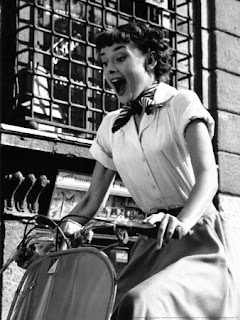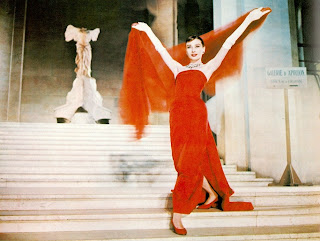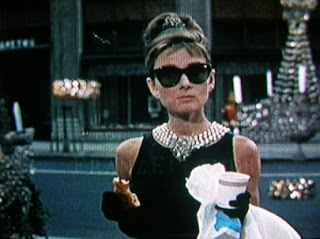These past two weeks are the first in months that I have gone without seeing a single new movie, the reason for this being that I am currently in a school production that engulfs a good portion of my spare time. What wonderful timing to begin a movie blog, you may well be thinking. However, I feel like I can squeeze in some time to watch one or two movies and then write up a review. I'm considering
Bringing Up Baby and
Lilies of the Field or
Network and
Bonnie and Clyde.
But this post is not about me or my rigorous cinephilia schedule. No, this post belongs to one of the most ethereal, kindhearted women in all the world, whose birthday was just yesterday (May the fourth be with you!); Audrey Kathleen Ruston/Hepburn. She died at the premature age of 63, but yesterday she would have turned 83.
Alas, I do not know Audrey the Person, though I can dream, so I can only discuss Audrey the Actress, the one who most of us know the best. My sole hope is that, to the fresh eyes of those who have not seen her, I can do her justice with my words.
 |
| Roman Holiday (1953) |
After a handful of Shirley Temple films as a tot and the life-changing
All About Eve,
Roman Holiday was my first introduction to "old" movies (I prefer the term treasured), as well as my introduction to Audrey (should I refer to her by last name? It feels so distant). Needless to say, my world was rocked. It was the first time I noticed how writing, directing, acting, and sets/costumes could all meld together seamlessly into something so compelling to the senses. Despite a romantic comedy plot that would seem preposterous compared to the relatively realistic feel of today's movies (it's one of the best parts of the film, to be honest), everything feels completely fresh upon further viewing, invoking riotous laughter in places one would have thought to be dated. This naturalism is due in no small part to Hepburn's performance as Princess Ann, her first starring role for which she deservedly won the Oscar for Best Actress in a Leading Role. She was a revelation to me; in a time where so many actors were melodramatic, how did she know that only a look held so much? In her gowns, she has refined grace and poise, her hair pulled back into a severe bun, but her entire demeanor shifts into that of a giggly, wide-eyed child exploring the world for the first time the minute she is free of her courtly constraints. For once, she gets to enjoy the world, Rome specifically, and we get to enjoy it with her. Gregory Peck, one of my true loves, isn't too hefty a load on the senses either.
 |
| Sabrina (1954) |
Though I am not melting with adulation over
Sabrina like I am for the movie above, I did enjoy it immensely. While it is grounded more in realism than
Roman Holiday, in some ways it isn't. I mean, how could either Humphrey Bogart or William Holden not immediately swoon over her? Suspension of disbelief, I tell myself, suspension of disbelief…Anyway, this one came immediately a year after RH, ensuring Hepburn's status as a star for the ages. Most people remember
Sabrina for Hepburn's copious amount of dresses, each one equally elegant and drool-worthy for anyone who likes pretty things, but the film is actually quite funny at certain points, and features an impossibly gorgeous love triangle. Hepburn makes Sabrina's transformation from meek and mousy to (forgive me if I overuse the word) elegant and assured with ease. How does she always make it look so easy? Having dabbled in acting, I can tell you that trying to be natural is far more difficult than it appears to be.
 |
| Love in the Afternoon (1957) |
And now on to my favorite of all her films. Glancing briefly at the synopsis of
Love in the Afternoon, one would not think it different from any other part of her filmography; the young, vestal waif running about Paris with an older gentleman, pretty dresses, lush scenery. And maybe it isn't really different at all, but something in it struck a chord with me. The romance between Hepburn and Gary Cooper, around 25 years her senior, seems so real. Most people think that Cooper wasn't right for the role and that he was too old, which is probably true, but it worked for me. What I like the most is that this naive girl, who is trying so hard to be sophisticated, can change this worldly man's view of the world so distinctly. Or maybe I just really like her hairstyle.
 |
| Funny Face (1957) |
Now, her first musical. I really like the color palette of
Funny Face; it's all soft pastels, like works of art. I totally related to Hepburn's character of Jo Stockton, a bookish type who doesn't want anything to do with fashion. However, I cannot believe that people complained about Gary Cooper as her romantic counterpart but not Fed Astaire. But, nevertheless, I found this movie to be a delightful treat. She didn't have the best technical singing voice, but it's still as lovely to hear as her speaking voice, and she infuses so much emotion into her songs. And her dancing is a wonder to behold. It must have been nice for her, trained in ballet, to have a chance to show off her skills.
 |
| Breakfast at Tiffany's (1961) |
Undoubtedly, this is the Audrey Hepburn movie that most people have seen or heard of, but still it's mostly regarded for its fashionable stills of Hepburn that adorn many girls' walls (including my own).
Breakfast at Tiffany's is this blend of kookiness, romance, and melancholy. Somehow, it all works, but let's keep Mickey Rooney's stereotyping scenes out of this; they are irrelevant. I've seen
Breakfast at Tiffany's six or seven times and yet it never seems to get old. Hepburn claimed the role of Holly Golightly to be her most strenuous, as she was an introvert and the character is an extrovert, but it never once shows. She rattles through those lines with such finesse that I always believe that Holly, despite her numerous eccentricities, could be a real person. Every time she sings "Moon River," tears spring to my eyes.
 |
| Charade (1963) |
Conversely, I'm going to assume that
Charade is one of her films that people have seen the least. And what a shame! It's been called the "best Hitchcock film that Hitchcock never made," a statement with which I agree fully. It has a dash of everything for everyone; suspense, humor, romance, excitement, and she and Cary Grant are at the top of their game. If only they were paired in another movie, they have such ingenious chemistry (but, then again, Grant had chemistry with every leading lady). I also have to point out Henry Mancini's score. It adds an extra layer of suspense and thrills that only music can bring.
 |
| My Fair Lady (1964) |
My Fair Lady is not an Audrey Hepburn film, but rather a film that happens to have Audrey Hepburn. It is not set in Paris, the costumes, while beautiful, are not Givenchy, and equal amount of time is given to her leading man as it is to her. But it is the epitome of the movie musical, a genre that was gasping its last forceful breath during the 60's (just look at the Best Picture winners of that decade: four musicals). Hepburn is so different in this role, and yet still so lovely and affirms her great screen presence. I don't understand why people complained about her Cockney accent; it seems fine to me, but I'm not from England. Though her singing voice was dubbed by Marni Nixon, Hepburn still brings her infinite charm to Eliza Doolittle.
 |
| How To Steal a Million (1966) |
It's been some time since I last watched this movie, but I remember that it didn't leave much of an impression on me. Hepburn is wonderful, but that's a given, and I really liked Peter O'Toole (those blue eyes!), but it was just a fun little romp peppered with a few laughs. Not to perpetuate the idea that all Audrey Hepburn films are basically the same, but
How to Steal the Million felt almost like it was mimicking
Charade. But this post is for my love for Audrey Hepburn, and she
does look wonderful with that eyeliner.
 |
| Wait Until Dark (1967) |
If I thought
My Fair Lady was different than Hepburn's usual movies, then I was in for a shock. As the blind Susy Hendrix, she took on one of her most challenging roles, I think, and handled it superbly. As the core of the movie, you cannot take your eyes off her. I could distinctly felt her trepidation at every slight move. The 60's feel, especially the presence of heroin, was something new to the previously pristine movies of her past. For several years after this powerful performance, she would retreat into semi-retirement.
I did it; I managed to write about every Audrey Hepburn film I've seen. Each of them, while all differing in quality, has something worthwhile in them. And so thank you, Audrey, for giving your heart and soul to each of them. I, and so many others, could not imagine cinema without you.









No comments:
Post a Comment